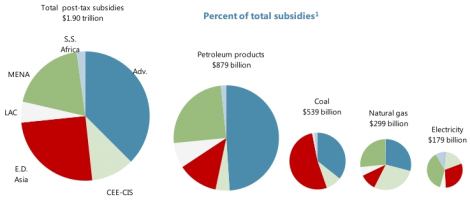In the hotly politicised energy arena, public attention is rarely drawn to the fact that fossil fuels receieve incentives which are far greater than those provided to support clean and renewable energy.
Government incentives are widely accepted as being critical to the energy sector, particularly given that it is such an essential public good.
A new report [PDF] from the International Monetary Fund (IMF) has identified that a conservative estimate of fossil fuel incentives total $480Bn a year globally for direct pre-tax subsidies and $1.9 trillion per year for post-tax incentives. Together these equate to more than 3 percent of global GDP.
The IMF identify six key elements for subsidy reform:
- a comprehensive energy sector reform plan
- an extensive communications strategy, including information on the magnitude of subsidies
- appropriately phased price increases
- improving the efficiency of state-owned enterprises
- targeted measures to protect the poor
- institutional reforms that depoliticize energy pricing
Read IMF says global subsidies to fossil fuels amount to $1.9 trillion a year
Source: Grist
